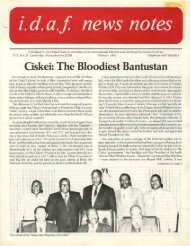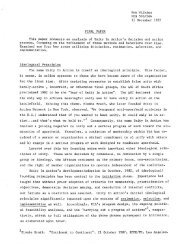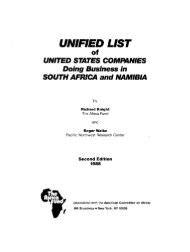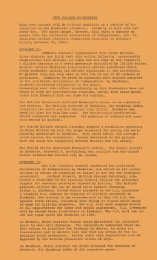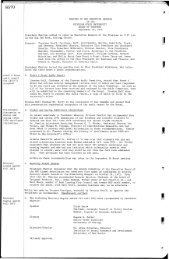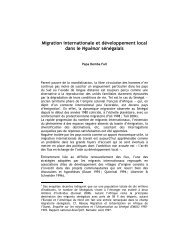the churches and southern africa - KORA
the churches and southern africa - KORA
the churches and southern africa - KORA
You also want an ePaper? Increase the reach of your titles
YUMPU automatically turns print PDFs into web optimized ePapers that Google loves.
vary considerably, but <strong>the</strong>re is widespread agreement that<br />
a viable alternative policy for <strong>the</strong> U.S. Government is<br />
imperative <strong>and</strong> urgent There is also an increasingly<br />
general consensus on at least <strong>the</strong> minimum basis for such<br />
an alternative policy.<br />
It is generally agreed that it should be a basic principle<br />
of U.S. policy that no actions be taken by <strong>the</strong> American<br />
Government which might in any way impede <strong>the</strong> growth<br />
of <strong>the</strong> struggle for majority rule; many go fur<strong>the</strong>r <strong>and</strong> call<br />
for various forms of recognition of <strong>and</strong> support for <strong>the</strong><br />
liberation movements. It is also widely agreed that U.S.<br />
policy must comprehend that violence is deeply Tooted in<br />
<strong>the</strong> Sou<strong>the</strong>rn African situation <strong>and</strong> has essentially meant<br />
white oppression of blacks; continuity as well as change<br />
will inevitably involve violence, <strong>and</strong> <strong>the</strong> goal is <strong>the</strong>refore<br />
to WORK TOWARD a society which will not practice<br />
violence.<br />
Finally, it is generally accepted that <strong>the</strong> alternative<br />
approach must give greater support to <strong>the</strong> United Nations<br />
<strong>and</strong> recognize that Africa <strong>and</strong> Sou<strong>the</strong>rn Africa are of<br />
priority concern to <strong>the</strong> U.S. on <strong>the</strong>ir own merits-<strong>and</strong> are<br />
not appendages to Europe to be considered only in<br />
moments of crisis, Such a policy attempts to respond to<br />
<strong>the</strong> quest for a stable peace in Africa <strong>and</strong> to <strong>the</strong> concerns<br />
of a growing American constituency on<br />
Africa-particularly Afro-American.<br />
One source for such an.alternative plan can be found in<br />
<strong>the</strong> report issued last Dec'ember by <strong>the</strong> United Nations<br />
Association of <strong>the</strong> U.S.A. <strong>and</strong> entitled "Sou<strong>the</strong>rn Africa:<br />
Proposals for Americans" (hereafter UNA Report). This<br />
report was prepared by a panel of 14 persons primarily<br />
from <strong>the</strong> business, legal, <strong>and</strong> university worlds <strong>and</strong><br />
represents <strong>the</strong> perspective of <strong>the</strong> liberal wing of <strong>the</strong><br />
foreign policy establishment. It calls for judicious<br />
involvement of American business <strong>and</strong> government<br />
interests in Sou<strong>the</strong>rn Africa within <strong>the</strong> framework of <strong>the</strong><br />
basic decisions of <strong>the</strong> United Nations. A stronger <strong>and</strong><br />
more thoroughgoing alternative policy proposal has<br />
emerged from various statements <strong>and</strong> proposals made by<br />
members of <strong>the</strong> Congressional Black Caucus, most<br />
notably in <strong>the</strong> Action Manifesto of Congressman Diggs<br />
issued on Dec. 14, 1971. (Congressional Record, Jan. 18,<br />
1972) The Diggs' Manifesto describes Sou<strong>the</strong>rn Africa as<br />
an actual "threat to peace" <strong>and</strong> calls for more positive<br />
action. The intent of both statements is contained in <strong>the</strong><br />
1972 Democratic Platform calling for an end to all<br />
military aid to Portugal <strong>and</strong> <strong>the</strong> ab<strong>and</strong>onment of <strong>the</strong><br />
Azores Agreement, enforcement of sanctions against<br />
Rhodesia <strong>and</strong> of U.N. control over Namibia, <strong>and</strong> stronger<br />
opposition to apar<strong>the</strong>id in South Africa.<br />
In what follows, alternative possibilities are examined<br />
with regard to each major area of Sou<strong>the</strong>rn Africa. First<br />
come <strong>the</strong> major U.N. positions on <strong>the</strong> question, <strong>the</strong>n <strong>the</strong><br />
minimal changes that enjoy wider acceptance, <strong>and</strong> finally<br />
<strong>the</strong> changes in U.S. policy that correspond more closely<br />
to <strong>the</strong> commitment of <strong>the</strong> U.N. <strong>and</strong> to a fully creative<br />
approach to <strong>the</strong> subcontinent.<br />
Alternatives Examined<br />
SOUTH AFRICA. The U.N. position on South Africa<br />
is exceedingly clear. As recently as 1970 <strong>the</strong> General<br />
Assembly overwhelmingly adopted a resolution urging all<br />
members "to terminate diplomatic, consular, <strong>and</strong> o<strong>the</strong>r<br />
official relations with <strong>the</strong> South African Government, to<br />
terminate all military, economic, technical, <strong>and</strong> o<strong>the</strong>r<br />
cooperation with South Africa, <strong>and</strong> to end tariff <strong>and</strong><br />
o<strong>the</strong>r preferences to South African exports <strong>and</strong> facilities<br />
for investment in South Africa .. "<br />
In <strong>the</strong> area of investment <strong>and</strong> <strong>the</strong> involvement of<br />
American companies, <strong>the</strong> mildest proposals of reform call<br />
for some application of fair employment practices to <strong>the</strong><br />
operation of U.S. firms, <strong>the</strong> end of contributions by<br />
companies to <strong>the</strong> propag<strong>and</strong>istic South Africa<br />
Foundation, no additional investment or expansion of<br />
facilities <strong>and</strong> no sale of strategic products to <strong>the</strong><br />
South African Government.<br />
The UNA Report (p. 47) commends Polaroid<br />
Corporation for its decisions to (1) withdraw <strong>the</strong> sale of<br />
its ID2 system to <strong>the</strong> South African Government; <strong>and</strong> (2)<br />
improve <strong>the</strong> working conditions of its black employees,<br />
<strong>and</strong> <strong>the</strong>n suggests that o<strong>the</strong>r firms follow <strong>the</strong> Polaroid<br />
example. The Polaroid model has, however, been severely'<br />
criticized as invalid both in method <strong>and</strong> content, since (1)<br />
<strong>the</strong> whole process of Polaroid's investigation <strong>and</strong> review<br />
of operations is internal <strong>and</strong> not subject to outside<br />
scrutiny; (2) despite much publicized figures which<br />
indicate considerable wage increases for black workers,<br />
many are still working at close to starvation (poverty<br />
datum line) wages <strong>and</strong> <strong>the</strong>re is no structural alteration of<br />
<strong>the</strong> business by placing blacks in positions of control.<br />
Even <strong>the</strong> minor reforms made are likely to run aground<br />
against local law <strong>and</strong> custom <strong>and</strong> never approach <strong>the</strong> basic<br />
criteria of equal pay AND equal work; (3) <strong>the</strong> number of<br />
black workers at Polaroid's affiliate is absolutely <strong>and</strong><br />
proportionately so small t~at <strong>the</strong> example is not<br />
applicable to <strong>the</strong> important American operations in <strong>the</strong><br />
country; <strong>and</strong> (4) <strong>the</strong> responsibility of a company cannot<br />
be limited solely to <strong>the</strong> material working conditions of its<br />
employees, but extends to <strong>the</strong> whole environment of<br />
which <strong>the</strong>y are a part.<br />
The most serious proponents of a changed policy call<br />
ei<strong>the</strong>r for <strong>the</strong> full application of fair employment<br />
practices now applied in <strong>the</strong> U.S., under penalty of loss of<br />
eligibility for government contracts, or for complete<br />
disengagement from South Africa. The first position,<br />
advocated in <strong>the</strong> Diggs Manifesto (item 30), would almost<br />
certainly ultimately result ,in disengagement under <strong>the</strong><br />
present apar<strong>the</strong>id regime. 'The implementation of such a<br />
'position would require <strong>the</strong> U.S. Government to establish<br />
a watchdog committee <strong>and</strong> to state clearly that<br />
investments would not be subject to <strong>the</strong> normal<br />
guarantees.<br />
In <strong>the</strong> area of trade with South Africa, a minimal<br />
position would implement completely <strong>the</strong> 1963 arms<br />
embargo voted by <strong>the</strong> U.N., construing that embargo to<br />
include all materials with potential military use. It would<br />
end South Africa's sugar quota (expires 1974) <strong>and</strong> all<br />
loans <strong>and</strong> guarantees by <strong>the</strong> Export-Import Bank, <strong>and</strong><br />
would encourage trade with independent Africa intead of<br />
<strong>the</strong> subcontinent Diggs goes beyond <strong>the</strong> UNA Report to<br />
oppose any collaboration with South Africa in <strong>the</strong><br />
development or production of military equipment such as<br />
<strong>the</strong> Cactus Missile (item 36d) <strong>and</strong> to advocate <strong>the</strong><br />
enforcement of <strong>the</strong> prohibition against importation of<br />
goods produced by forced labor, for which most South<br />
African products would quality (Section 307 of <strong>the</strong> Tariff<br />
Act of 1930; item 34 of <strong>the</strong> Manifesto). All of <strong>the</strong>se<br />
positions stop well short of <strong>the</strong> U.N. dem<strong>and</strong> for general<br />
sanctions.<br />
In <strong>the</strong> area of direct governmental presence, both Diggs<br />
<strong>and</strong> <strong>the</strong> UNA Report call for <strong>the</strong> integration of <strong>the</strong><br />
American diplomatic staff in South AFrica, a ban on<br />
all-white functions, selective boycotts, <strong>and</strong> a phasing out


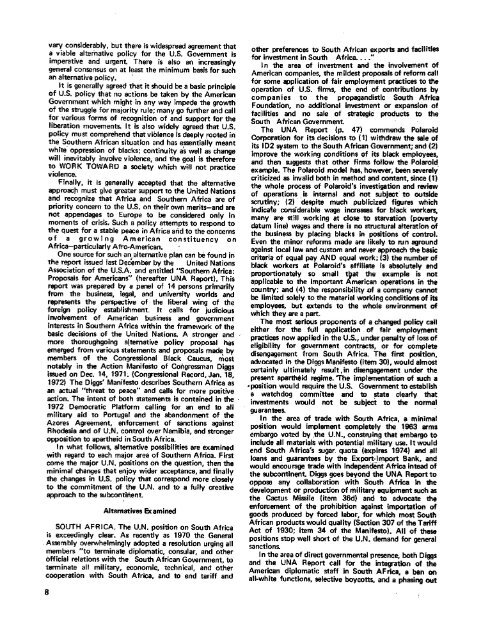
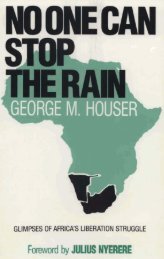
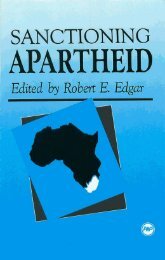

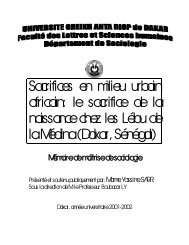
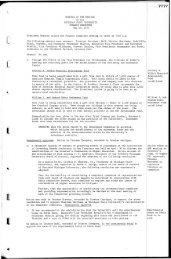
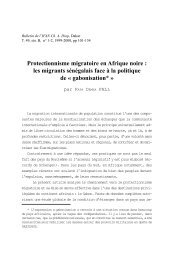
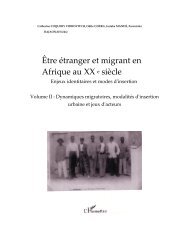
![Synthèse [6] DEFALL..INSTRAW.pdf - Matrix](https://img.yumpu.com/17880734/1/190x245/synthese-6-defallinstrawpdf-matrix.jpg?quality=85)

